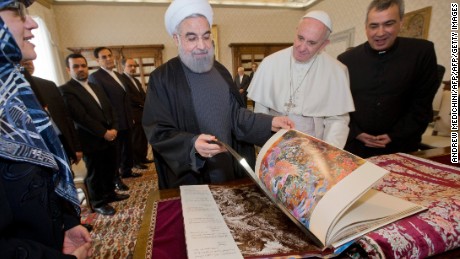
An imposing equestrian statue of Roman Emperor Marcus Aurelius dominated the room where Italian Prime Minister Matteo Renzi and Iranian President Hassan Rouhani met on Monday.
But Rouhani could not admire some of the other masterpieces at Rome’s world-famous Capitoline Museums, which hosted the meeting.
The museum’s naked statues, including a centuries-old Venus, had been covered up in white panels — a decision that provoked some strong criticism in the country.
#Rohani a Roma, coperte alcune statue di nudi ai #musei #capitolini https://t.co/puZB814hPa pic.twitter.com/NQBcIEjY6d
— Agenzia ANSA (@Agenzia_Ansa) January 26, 2016
Italian media reported that the statues had been covered to show respect to the Iranian culture and sensitivity.
A spokesperson for the city of Rome, which manages the museum, said that plans for the meeting had been made by the Office of the Prime Minister. The Italian government has not commented on the matter.
The statues that were covered were in rooms adjacent to the room where Renzi and Rouhani made their joint statement Monday.
The decision infuriated many Italians, who took to social media to express their views. They accuse the government of betraying Italian history and culture for the sake of economic interests and to please the international guest.
Under the hashtag #statuenude, angry Italian tweeters posted pictures of famous nude sculptures.
Ciao #Rouhani. #statuenude pic.twitter.com/DHwfDVeiNd
— Mangino Brioches (@manginobrioches) January 26, 2016
Gian Lorenzo Bernini – Il Ratto di Proserpina -1621/22. Galleria Borghese, Roma. (Particolare) #statuenude pic.twitter.com/WyaMySqB6s
— LaMentina (@ch_distef) January 26, 2016
Following a diplomatic custom for visiting Muslim dignitaries, no alcohol was served at official receptions.
This is the first time an Iranian president has officially visited Europe in 16 years. Rouhani planned to visit France in November but canceled at the last minute, following the attacks in Paris. The trip comes a few days after the economic sanctions against Tehran were lifted following the implementation of the nuclear deal.
In Rome, Rouhani met Italian President Sergio Mattarella, Renzi and Pope Francis and signed business deals with Italian companies worth about 17 billion euros ($18 billion).
As reported by CNN
